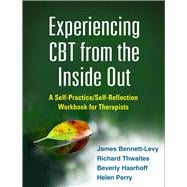
Experiencing CBT from the Inside Out A Self-Practice/Self-Reflection Workbook for Therapists
by Bennett-Levy, James; Thwaites, Richard; Haarhoff, Beverly; Perry, Helen; Padesky, Christine A.Buy New
Rent Textbook
Rent Digital
Used Textbook
We're Sorry
Sold Out
How Marketplace Works:
- This item is offered by an independent seller and not shipped from our warehouse
- Item details like edition and cover design may differ from our description; see seller's comments before ordering.
- Sellers much confirm and ship within two business days; otherwise, the order will be cancelled and refunded.
- Marketplace purchases cannot be returned to eCampus.com. Contact the seller directly for inquiries; if no response within two days, contact customer service.
- Additional shipping costs apply to Marketplace purchases. Review shipping costs at checkout.
Summary
Author Biography
Richard Thwaites, DClinPsy, is a consultant clinical psychologist and CBT therapist who serves as Clinical Lead for a large National Health Service psychological therapies service in the United Kingdom. In addition to delivering therapy, he provides clinical leadership, supervision, training, and consultancy around the implementation of SP/SR programs. His research interests include the role of the therapeutic relationship in CBT and the use of reflective practice in the process of skill development.
Beverly Haarhoff, PhD, a clinical psychologist, is Senior Lecturer in the School of Psychology at Massey University, Auckland, New Zealand, where she was instrumental in setting up the first Postgraduate Diploma in CBT in the southern hemisphere. For the past 14 years she has trained and supervised both CBT and clinical psychology trainees. Her research has focused primarily SP/SR as a mechanism to support and improve therapist skill acquisition in CBT therapists at all levels of development. Dr. Haarhoff has a private clinical practice and regularly presents CBT training workshops.
Helen Perry, MA, is Adjunct Senior Lecturer at the University of Sydney and works clinically in a well-established group private practice. She is an active CBT trainer and supervisor in Australia and New Zealand. Together with Beverly Haarhoff, she played a pivotal role in establishing the CBT Diploma program at Massey University, New Zealand. She has run many workshops at the University Centre for Rural Health, University of Sydney. Ms. Perry has worked across the lifespan in a wide range of clinical settings. Her special interests are in complex/comorbid depression and anxiety, and trauma- and stress-related disorders.
Table of Contents
2. The Conceptual Framework
3. The Facilitator’s Guide
I. Identifying and Understanding Unhelpful (Old) Ways of Being
Module 1. Identifying a Challenging Problem
Module 2. Formulating the Problem and Preparing for Change
Module 3. Using Behavioral Activation to Change Patterns of Behavior
Module 4. Identifying Unhelpful Thinking and Behavior
Module 5. Using Cognitive Techniques to Modify Unhelpful Thinking and Behavior
Module 6. Reviewing Progress
II. Creating and Strengthening New Ways of Being
Module 7. Identifying Unhelpful Assumptions and Constructing New Alternatives
Module 8. Using Behavioral Experiments to Test Unhelpful Assumptions against New Alternatives
Module 9. Constructing New Ways of Being
Module 10. Embodying New Ways of Being
Module 11.Using Behavioral Experiments to Test and Strengthen New Ways of Being
Module 12. Maintaining and Enhancing New Ways of Being
Module Notes
References
Index
An electronic version of this book is available through VitalSource.
This book is viewable on PC, Mac, iPhone, iPad, iPod Touch, and most smartphones.
By purchasing, you will be able to view this book online, as well as download it, for the chosen number of days.
Digital License
You are licensing a digital product for a set duration. Durations are set forth in the product description, with "Lifetime" typically meaning five (5) years of online access and permanent download to a supported device. All licenses are non-transferable.
More details can be found here.
A downloadable version of this book is available through the eCampus Reader or compatible Adobe readers.
Applications are available on iOS, Android, PC, Mac, and Windows Mobile platforms.
Please view the compatibility matrix prior to purchase.
